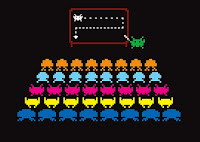Unlike some old schoolers I'm also willing to acknowledge that some WotC-era mechanics have merit. Feats or skills a la 3.x aren't deal-killers in my book. Putting them into the 3.x chargen system grinds my gears, but in isolation both are decent mechanics. And in my current Labyrinth Lord campaign I am seriously considering switching to either 3-fold saves (Fort/Reflex/Will). My group as a whole just doesn't seem to grok the old save system and I think Reflex +4, Target 20 would suit many of them a crapload more. Or maybe I'll go to the single save method from Swords & Wizardry. I dunno.
But Moldvay's morale rules is probably the one D&D Basic mechanic I don't think anyone has ever topped. It's clearly labeled an optional rule and it only takes up half a page (B27 if you want to look it up yourself), but man that half-page packs quite a wallop. I'll summarize for folks who don't have a Basic D&D or LL rulebook handy: Every monster has a morale score in their statblock, rated from 2 to 12. At the first casualty received in combat and at 50% casualties you role 2d6. If you roll over the critter's morale score, the bad guys retreat, withdraw or surrender as adjudicated by the DM.
 I probably don't need to tell you how big a difference that simple rule can make in play. Far fewer fights are to the death. Smart PCs will boldy strike large groups of scaredy-cats, alpha-striking one poor bastard in hopes of spooking the rest. And since 1gp = 1xp, you still get most of your experience even if the DM is a stingy bastard who holds back points on routed (as opposed to killed) foes. Personally I normally consider routed monsters as 'overcome', which per B22 means they're worth full XP, unless the baddies have a fall-back position nearby or an opportunity to regroup. Either way, the morale rules are a total game changer, especially back when we were all dumb kids and approached combat about as tactically as the aliens in Space Invaders.
I probably don't need to tell you how big a difference that simple rule can make in play. Far fewer fights are to the death. Smart PCs will boldy strike large groups of scaredy-cats, alpha-striking one poor bastard in hopes of spooking the rest. And since 1gp = 1xp, you still get most of your experience even if the DM is a stingy bastard who holds back points on routed (as opposed to killed) foes. Personally I normally consider routed monsters as 'overcome', which per B22 means they're worth full XP, unless the baddies have a fall-back position nearby or an opportunity to regroup. Either way, the morale rules are a total game changer, especially back when we were all dumb kids and approached combat about as tactically as the aliens in Space Invaders.In fact, I think the morale rules need to be used more than Moldvay indicates. I often make a morale check for lone monsters when they are first wounded, extrapolating that the initial hit is to single critters what the first man down is to groups. I also think that some monsters should be scared of things besides attrition. For monsters like orcs that have problem with sunlight, a cleric using a surprise round to throw continual light might be enough to scare the bejeesus out of them. And frankly, lycanthropes should run like hell the first time silver is on the playing field. The smart ones will strategically withdraw at the first sign of the stuff, while the dumb ones will be completely shocked that something actually hurt them and run home to their mommas. Similarly, an adventurers boldly brandishing a torch might be able to freak out an entire pack of trolls. In these cases I might not allow a morale check in the monsters' lair, but I treat a lot of wandering monsters as regular joes who happen to work for Chaos. What's their percentage in sticking around to face their one weakness?
And maybe weapons that grant a bonus versus certain monster types just hurt like hell. A sword +1, +3 versus giants may not seem like all that much when you're second level and staring down an 18' tall viking, but maybe it stings so bad that they just won't want to bother squishing you. Especially if the dude knows that the blade you are wielding was the weapon of choice of a long line of giant-slayers.
Heck, in a lowish magic campaign the party wizard might be able to force a morale check out of superstitious peasant or bandits with a minor demonstration of eldritch badassery.








Không có nhận xét nào:
Đăng nhận xét